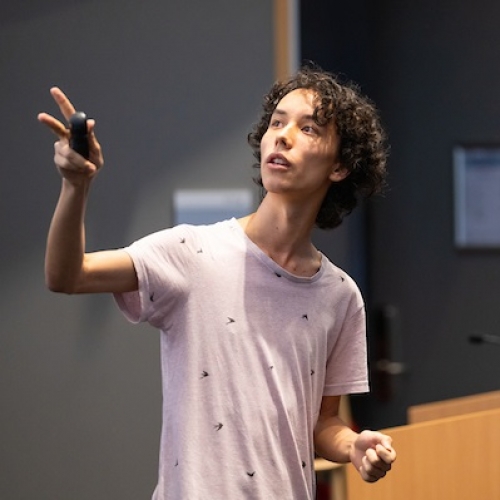
Damian Lin
The University of Sydney
Damian Lin grew up in Sydney and took interest in mathematics and science from a young age. In 2023, he completed his degree majoring in Mathematics and Physics at the University of Sydney. In 2024, he is pursuing an MPhil in Mathematics, also at the University of Sydney. Outside of mathematics, he enjoys board games, singing and slacklining.
1. Can you give me a quick rundown about the type of mathematics you are studying and its potential impacts for the broader community (think how you would explain your work and studies to others who don’t study maths)
The maths I study is knot theory – roughly we take a piece of string and tie it around itself and join the ends up. But there are many ways to do this – does our string end up in a circle, or does it have a knot in it? It may be very hard to tell, and even harder to find which tied up strings are the same as each other. Nevertheless, there is something neat about classification problems like this that draws mathematicians in. Broadly speaking, I look at a generalisation of knots that can’t just be drawn on the plane but need surfaces such as the surface of a donut. I study the tools, called invariants, we use to tell when two of these knots are definitely different. For how pure and distant-from-reality knot theory can seem, it’s amazing how much it is linked to branches of physics such as statistical mechanics and quantum theory. And not to mention the immediate applications to folding proteins and other long molecules in chemistry.
2. How did you get into mathematics/statistics/data science? Was there someone or something that inspired you to this field?
I was particularly interested in science from a young age, so it was a no-brainer to continue to study that at university. I must thank my supervisor Zsuzsanna Dancso who continues to be a joy to study under.
3. How did you get into mathematics/statistics/data science? Was there someone or something that inspired you to this field?
The AMSI Travel Grant was integral to my ability to attend and participate in the Summer School. Without it, I would never have had the same opportunity to meet and discuss mathematics with the amazing lecturers and students. The ability to discuss mathematics in-person is absolutely crucial to learning it well.
4. What was the most valuable part of the program for you?
Thanks to the travel grant I could live in the same building as the people I was taking the course with, and being constantly around people and able to talk about maths with them whenever really helped develop my understanding in the courses I took.
5. In the long-term,what do you think are the benefits of having attended Summer School?
AMSI Summer School has allowed me to devote time to a taking a course that I wouldn’t really be able to take otherwise! The things I learned are really fundamental for my research area, so this will certainly help me in my MPhil, and hopefully beyond to a PhD!
6. Summer School included a special Careers Day program which aims to help give students an idea of the kinds of career paths available to maths graduates in industry and private sector research areas. Do you feel better equipped to explore career options in the mathematical sciences after attending AMSI Summer School?
The careers day was enlightening and allowed my to ask people and find out more about which industries/professions I may like to work in, in the future.
7. What advice would you give to someone who is considering applying for Summer School in 2025? Should they apply and why?
AMSI Summer Schools have really been some of the highlights of my mathematical career. Often taking a class during semester, you’re bogged down with other things, whether that be extra-curricular commitments, other courses, thesis-writing or just life. But AMSI summer school is a place where you can go with the very specific focus: learn some maths and make friends with the other people doing, and that is a lot of fun.
8. What are your current career ambitions in the mathematical sciences sector?
After my MPhil, I would like to pursue a PhD in a similar area. Knot theory is really cool in how abstract it is, while still being incredibly fundamental in ways we haven’t yet fully explored to theoretical physics. I would love to work as a mathematician and continue to work on this!
9. What are your current career ambitions in the mathematical sciences sector?
Not only did making lots of new friends at AMSI summer school help me academically, but it also enhanced the experience socially. Highlights include cycling, slacklining, singing and playing boardgames with friends I made at summer school.
